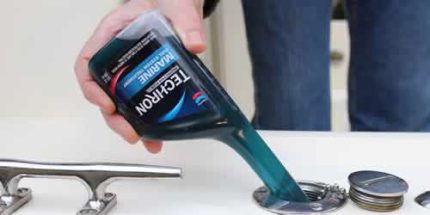Fighting Saltwater Corrosion from Stem to Stern
Boats that are used and stored in saltwater environments are under constant attack from a variety of corrosive elements. Every metal component on your boat, right down to the smallest screw or hose clamp, is susceptible to corrosion related damage. Sometimes, it’s simply a cosmetic issue, like a pitted railing or orange streaks wherever finish screws meet gelcoat. Corrosion damage can also result in much worse problems, including mechanical breakdowns and engine issues that can ruin a day on the water and/or put a big dent in your bank account.
You aren’t powerless against corrosion, however. Even though it’s a persistent foe, boaters who fight the good fight against corrosion can keep their vessels running well and looking good. Here are five key ways to battle corrosion in all areas of your boat:
Keep it Clean — Wash your boat thoroughly with soap and fresh water after every trip. Don’t stop with just quickly hosing down the deck; wash and scrub from bow to stern, paying special attention to metal components like railings, rod holders and hinges (hint: use a soft-bristle brush on everything other than the cockpit sole). Then thoroughly flush your engine with fresh water to remove any traces of salt water from the cooling system. If you keep your boat on a trailer, wash the trailer thoroughly with soap and water as well, making sure to rinse all of the salt off of the brakes.

Keep it Protected — If your boat is stored in its slip, make sure to tilt the outboard or I/O lower unit to its highest position, so your running gear isn’t constantly bathed in salt water. It’s also important to always keep your boat covered, whether in a slip or on the trailer. Towel-dry your boat after washing and install a full cover after every trip. Custom-made covers are a worthwhile investment because they are made to fit your boat securely and prevent pooling of rainwater or condensation.
Watch Your Zincs — Make sure you know where all of the sacrificial zinc anodes are throughout your boat, and replace them if they are degraded. These zinc “tabs” are commonly found on the engine lower unit and transom, but they can also be found inside the engine compartment, as part of your running gear, and elsewhere. Check your boat and engine owner’s manual to confirm how many there are and where they are. Zincs are made to be eaten away over time; by doing so they “sacrifice” themselves to protect other metallic components against galvanic corrosion. If they are neglected and wear away, they cannot perform this protective function.
Lubricate the Little Things — Lubrication doesn’t just keep things moving, it also protects against water intrusion and rust. Apply marine grease to the fittings on your outboard steering tilt tube and engine trim mechanism. On sterndrive boats, hit the gimbal bearing and engine coupler. Periodically go around the boat and apply a light coat of moisture-displacing lubricant to the myriad moving metal parts such as latches, hinges, linkages, bow rollers and the like. If it’s metal and it moves, treat it. Check your boat and engine owner’s manual to ensure you’ve identified all recommended lubrication points.
Protect Your Engine & Fuel System — Regardless how meticulously you treat corrosion on the outside your boat, it’s most painful in places where it can’t be seen – like inside your boat’s fuel system and engine. Techron® Marine Protection Plus Fuel System Treatment from Chevron is scientifically formulated to provide best-in-class corrosion protection in the harshest marine environments for the entire fuel system. Adding just one ounce per 10 gallons of fuel with every fill up will help keep any gasoline-powered boat running clean and strong all season long. Techron Marine also stabilizes fuel for an impressive 24 months. Additionally, store your boat with a full tank of fuel (95% or more) and take care of fuel system components you can see, by inspecting fuel lines, fittings, hose clamps, inline fuel filters and water-separating fuel filters. Clean or replace as needed.
It’s true that rust never sleeps. It can, however, be kept at bay by boaters who battle corrosion as an important part of their maintenance routine. To learn more about cleaning and protecting your boat’s fuel system and engine, visit TechronClean.com.
